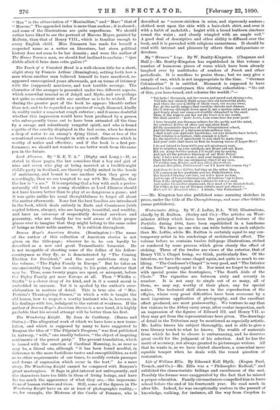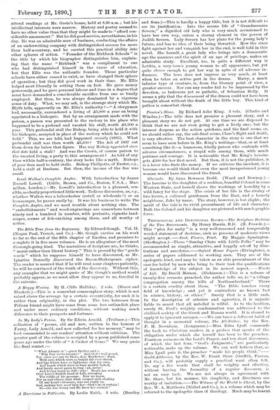Life of William Ellis. By Edmund Kell Blyth. (Kagan Paul,
Trench, and Co.)—Mr. Ellis was a " Philosophic Radical," and exhibited the characteristic failings and excellences of the sect. Possibly the former were exaggerated by the fact that he missed a proper education. Family circumstances compelled him to leave school before the end of his fourteenth year. He read much in after life. Indeed, he was exceptionally zealous in the pursuit of knowledge, walking, for instance, all the way from Croydon to attend readings at Mr. Grote's house, held at 8.30 a.m. ; but his intellectual interests were narrow. History and poetry seemed to have no other value than that they might be made to " afford con- siderable amusement." But he did good service, nevertheless, in his Clay. He was an admirable man of business, conducting the affairs of an underwriting company with distinguished success for more than half-a-century, and he carried this practical ability into other spheres of action. " Founder of the Birkbeck Schools " is the title by which his biographer distinguishes him, explain- ing that the name " Birkbeck " was a compliment to one who had distinguished himself in the cause of education, but that Ellis was the authentic founder. These particular schools have either ceased to exist, or have changed their sphere of operation ; but they did good work in their time. Mr. Ellis helped most liberally in setting them on foot. He gave money generously, and he gave personal labour and time in a degree that must have demanded a considerable sacrifice from one so busily employed. But then, he was always dominated by a vigorous sense of duty. What, we may ask, is the strange story which Mr. Blyth tells, apparently on Mr. Ellis's authority ?—" A clergyman had, necessarily, surrendered a living of £5,000 a year on being appointed to a bishopric. But by an arrangement made with the patron, a parson was presented to the rectory in his place who happened to be a prebend and vacated his stall, worth £3,500 a year. This prebendal stall the Bishop, being able to hold it with his bishopric, accepted in place of the rectory which he could not hold." This, we are told, had happened recently (1865). What prebendal stall was then worth .£3,500 ? The Act of 1837 cut them down far below that figure. Has any Bishop appointed since that date held a stall ? And was the Crown, of course patron to the vacated living, a party to this arrangement ? As told of any time within half-a-century, the story looks like a myth. Bishops of poor Sees used to hold stalls. Bishop Phillpotts, of Exeter, e.g., held a stall at Durham. But then, the income of the See was small.







































 Previous page
Previous page